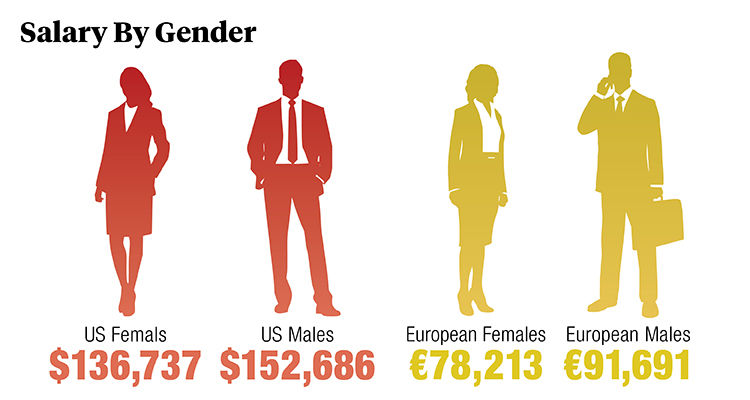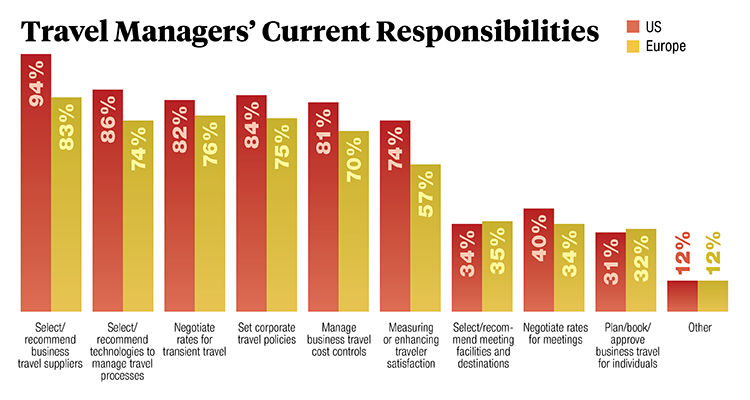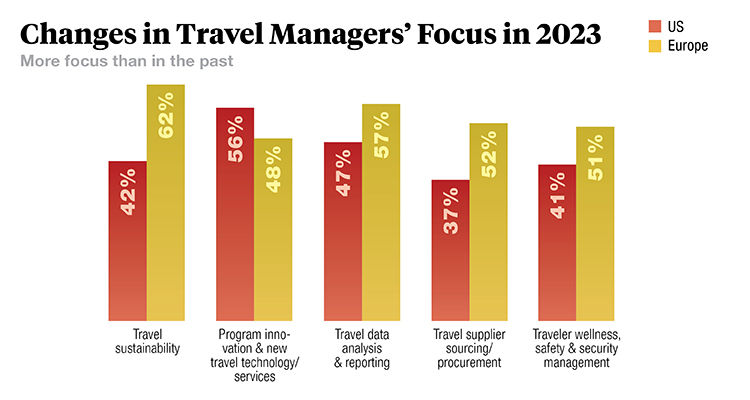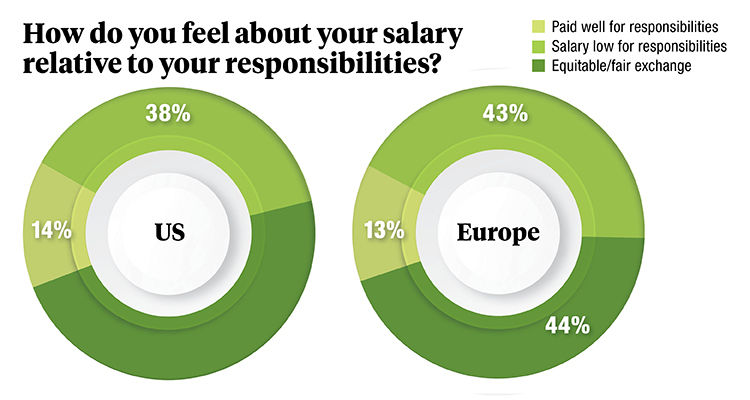[ad_1]
Business Travel News has tracked travel manager salaries since 1984 for the United States market. This is the first year BTN specifically surveyed the European market for its annual salary survey, thanks to the efforts of our colleagues at BTN Europe,
which has been a part of the BTN Group since 2020. Given BTN Europe’s inaugural participation in this annual research effort, there are no year-over-year comparisons for that market. The 2023 data alone, however, offers insights into regional similarities
and differences across the two markets.
READ THE REPORTS HERE:
BTN’s 2023 U.S. Travel Manager Salary
& Job Satisfaction Report
BTN’s 2023 European Travel Manager
Salary & Job Satisfaction Report
U.S. Average Travel Manager Salary Higher than Europe

On a like-for-like currency basis, the average U.S. travel manager salary at $141,075 was significantly higher than the $86,556 (€79,601) garnered by the average travel manager in Europe, though salaries varied on a regional basis through out the U.S.
and individual countries in Europe. The Rocky Mountain region offered the lowest salary level within the U.S., while Italy delivered the lowest travel manager salaries in Europe. The U.S. West Coast delivered the highest salaries overall—both in the
Seattle metropolitan area and San Francisco areas coming in strong. The U.K., Ireland and Germany offered strong salaries in the Europe market.
For both regions, salaries increased with years of travel management experience overall, but the real driver seemed to be the size of the travel program. Where travel spending was higher, there were clear salary jumps. That hasn’t always been tied together
with such clarity in BTN’s survey, but in 2023, the correlation is unmistakable.
Gender-based Salary Disparities Remain in Both U.S.
and Europe

Unfortunately, gender-based salary disparities continue to plague the travel management profession, despite the fact that the vast majority of travel managers are women. In both the U.S. and the Europe surveys, women represented more than two-thirds of
responses. Yet, in Europe, female travel managers responding to the survey made just 85 percent of what their male peers reported. In the U.S., it was slightly better, but women still reported salaries at just 89 percent of their male peers. Much
of the difference was driven by a disproportionate number of women holding the most junior or least professional titles like “assistant” or “coordinator,” but still carrying the function of travel management.
Current & Changing Job Responsibilities

Travel managers in Europe and the U.S. characterized their responsibilities as roughly parallel in terms of common expectations of the role. Ninety-four percent of U.S. travel managers said they select or recommend business travel suppliers for their
organizations. Similarly, the highest percent of European travel managers (83 percent) said they did the same. Eighty-six percent of U.S. travel managers said they select or recommend technologies to manage travel processes; similarly, 74 percent
of European travel managers also were tasked with technology decision-making. The same similarities were seen in setting travel policies, negotiating travel rates with suppliers and managing travel cost controls.
Measuring traveler satisfaction was the one area of common responsibility in the U.S. that was not shared as much by European counterparts. Seventy-four percent of U.S. travel managers reported that they actively measure satisfaction, but only 57 percent
of European travel managers said they did so. That’s still a majority, it should be noted, but not as strong.

There was more divergence between the U.S. and European travel management practices when it came to new responsibilities and changing focus in priorities.
Nearly 50 percent more European travel managers reported prioritizing travel sustainability in the past 12 months compared to U.S. travel managers. Perhaps as a corollary to that effort—given the Corporate Sustainability Reporting Directive regulations
going into effect in Europe—more European travel managers than U.S. travel managers have stepped up their travel data analysis and reporting efforts.
More than half of U.S. travel managers said they had prioritized program innovation with new travel technology and/or services over the past 12 months, likely pushed by gaps created by New Distribution Capability which roiled the travel management industry
during that time period. Travel managers also reported more attention to artificial intelligence and other technologies that could enhance travel management services. Less than half of European travel managers had increased the priority of innovation;
but there was a still a strong cohort at 48 percent in the region putting more focus on innovation.
Striking a Balance: Salary v. Responsibilities

When it comes down to satisfaction with salary levels themselves, U.S.- and Europe-based travel managers naturally organized into similar cohorts again. Forty-eight percent of U.S. travel managers and 44 percent of European travel managers said their
salaries offered an equitable exchange for their responsibilities; 14 percent of U.S. travel managers and 13 percent of European travel managers said they were paid well for their work. Thirty-eight percent of U.S. travel managers and 43 percent of
European travel managers, however, considered their salaries too low given the complexity and value of their roles in their organizations.
READ
THE FULL REPORTS:
BTN’s
2023 U.S. Travel Manager Salary & Job Satisfaction Report
BTN’s
2023 European Travel Manager Salary & Job Satisfaction Report
[ad_2]
Source link
